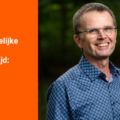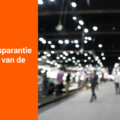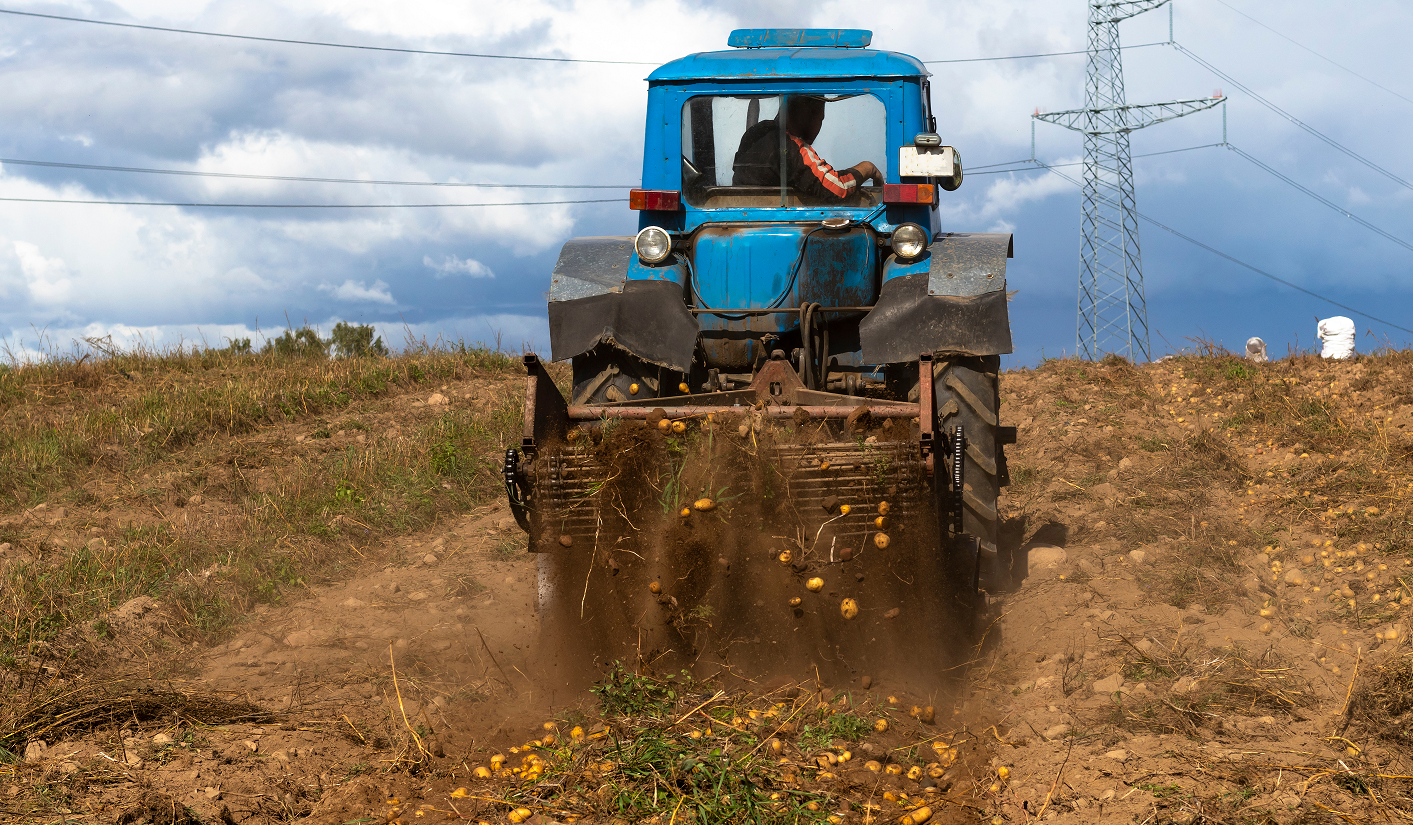
The future of issues - Cees-Jan Adema
For a new series of interviews 'The Future of Issues', we will speak with various experts in the coming weeks about the future of issues within their sector. What are they betting on? What can we expect in the future? How can we best deal with this? And what could or should be the role of society and government? We discuss it all.
We start the series with an interview with Cees-Jan Adema, the new director since January 1 Federation of the Dutch Food Industry (FNLI). The FNLI is the umbrella organization and advocate for companies and sectors in the Dutch food industry.
What did you see as the most important challenge when you started at FNLI?
The entire food industry is changing rapidly. With increasing attention from consumers to sustainability and health, which the food sector anticipates and implements. This is an ongoing trend that is changing the environment in which we work. Themes such as pricing, climate transition, circularity and prevention will determine the agenda of companies, governments and NGOs in the coming years. An important challenge for FNLI - as an interest organization - is how to ensure that all companies affiliated with us and the entire chain with which we collaborate - from farmers to final processors - contribute to the changing environment. The ultimate goal is that the food sector can remain the internationally strong player that it is now and preferably can strengthen it even further.
How do you want to do that?
Our members must feel connected to us, must be willing to put extra effort into the changes and take on a different role. We must make use of everyone's knowledge. Working with and for your members in a different way. As an interest group, you are the one who makes these types of processes possible. You must offer a perspective for the future together with the members, and also put this on the external agenda. This means that you must have an open way of looking at things and that you must help your supporters and other parties to make the transition. Modesty from the interest group is important. The real flag bearers are the members, not us. They are the ones who do the work. It is important that you not only focus on the flag bearers and frontrunners, but especially on the peloton, the organizations and companies that may have less knowledge and resources to lead the way.
It is essential for me to work proactively on this. If you are only in a reactive mode, as an interest group you will quickly run out of ideas. It is also important that you stimulate discussion about important issues. Not only internally, but also externally. For example, we have had a robust discussion about the climate agreement, where in our opinion the bill has not been properly divided between the sectors. As a sector, we are faced with the task of significantly reducing CO2 emissions and want to implement this, which of course requires investments. At the same time, you can expect that all sectors are treated equally. As an interest group, you must also stand squarely in front of your members on these preconditions.
What important developments have you seen in the food industry in recent months?
I have mainly used the past few months to see how the industry works. How does it work? Where is the energy? What is the motivation? Where are the biggest changes? I have had great conversations with almost the entire industry. Everyone is aware that we as a sector, like many others, face major challenges in which we want to play a role. I sense a lot of motivation to achieve this and experience in every conversation how enthusiastic the sector is and how busy companies are taking steps in the field of health, sustainability and new market initiatives. Corona has made many companies even sharper and more inventive and their resilience is enormous. We have seen this during the lockdown periods. It is a mega achievement that despite the global epidemic, supermarket shelves have never been empty. A lot of hard work has been done behind the scenes and a lot of improvisation has been done to keep the chains going. This also provides new opportunities with an extra boost for innovation. For example, I spoke with a member who (initially out of necessity) digitized parts of the innovation process. After a number of months it turned out that this accelerated the lead time of product innovations. Corona has made us aware of the vulnerability of our society and has only accelerated developments in health and sustainability.
What are the most important issues that the food industry will face in the next 10 years?
There are numerous issues within the food industry. You can also call them challenges. Consider, for example, food waste, product pricing, sugar, fat, smaller packaging, food safety, and the protein transition. Topics in which we play our role. We do this because of the responsibility we have as a sector, but also because we are convinced that tomorrow's consumers also expect the same from us. After all, we are very close to people with nutrition and nutrition concerns everyone. All these issues exist both within the food industry and within society and determine the future of our sector. It is important that we have that debate fact based continue to be implemented and that clear choices are also made by politicians. However, let us not lose sight of the fact that our sector lives from imports and exports and that a level European playing field is therefore crucial. It is a utopia and also undesirable if we close the borders and withdraw behind the dikes. Particularly internationally, we as a sector can make a major contribution together with the government. Not only with our beautiful products, but also with the knowledge that has been built up in the Netherlands in the field of sustainable production and product innovations over the decades. We are happy with the contours of Frans Timmermans' Farm-toFork strategy. This levels the playing field for everyone in Europe and also creates a perspective for our members that you can focus on.
Our strength lies in the innovation and resilience of the sector. A lot of work is being done on the protein transition, even within companies that traditionally produce animal proteins. Companies such as Vion and Zwanenberg Food Group are working hard on developing alternatives to meat and are already marketing them. This gives consumers more and more options. Work is being done within many sectors to combat food waste. For example, a pilot has been started in the bakery sector to reduce bread waste. A lot of work is being done on product reformulation within all sectors and we will continue to take steps in this direction. The introduction of Nutriscore (a consumer information logo developed by the government) will accelerate this even further. I believe that the food sector can and will continue to play an important role in meeting the challenges. However, a number of preconditions are important for this, such as a (European) level playing field, clear choices from the government and a market that rewards innovations. The latter is becoming increasingly problematic in a market in which price pressure is only increasing.
How do you deal with these issues?
First of all, the added value of the industry must become clearer. People are increasingly paying more attention to what they eat, how much they eat, how much food they waste, how sustainable their diet is, etc. Consumers now talk about food and the choices they make very differently than they did about thirty years ago. We must help consumers make a responsible and sustainable choice. We must move from volume to added value. Consider not only the composition and taste of a product, but also sustainability aspects. That is quite complicated because we operate in a market that is very depressed in terms of prices.
In addition, it is important to be transparent. We must show what is in the food products, how we are adapting the products, how the chain is structured, what dilemmas we encounter, etc. We must dare to talk about this. We don't have to tell consumers what to do, but we just have to be transparent about what we do, what we want to achieve and why.
What are the biggest pain points in doing this?
Not every company has the same innovation power or knowledge. Many larger companies often have more options than small companies. That is something we as FNLI must pay attention to. I also think it is a shame that the discussions are now often emotional in nature and are conducted from an ideological background. This sometimes makes trading difficult. I would like to pay more attention to the facts.
What do you expect from the government and society?
Finally, I expect a clear and, above all, consistent policy from the government that is based on a vision of where we want to go with the food industry in the Netherlands. This must be an integral picture based on the importance of the sector for the Netherlands. Not only from an economic point of view (as the largest manufacturing industry in the Netherlands), but also from the role that the sector can play in major social themes. Not only in the Netherlands, but also internationally. We have a unique ecosystem here in which the chain works closely with knowledge institutes. I sometimes have the impression that we are internationally renowned, but forgotten nationally. We should bring back that pride a little more. It is up to us to work on this together with the government and I am happy to take up that challenge.





